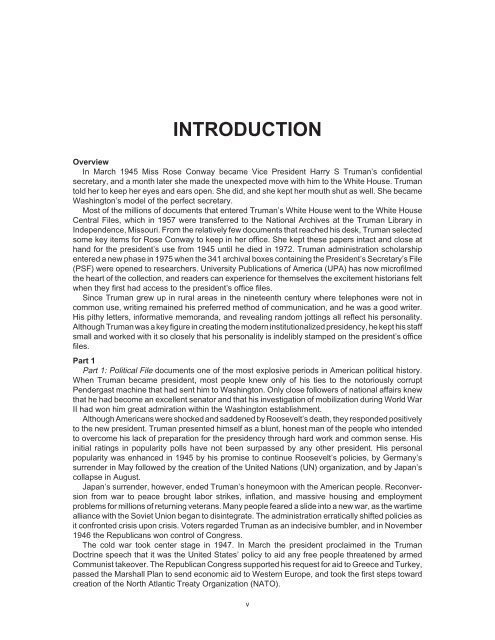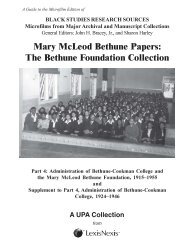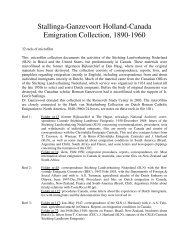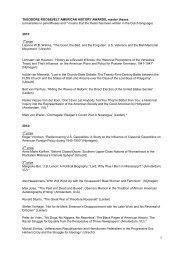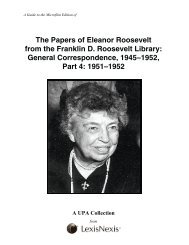president harry s truman's office files, 1945–1953 - Roosevelt Study ...
president harry s truman's office files, 1945–1953 - Roosevelt Study ...
president harry s truman's office files, 1945–1953 - Roosevelt Study ...
You also want an ePaper? Increase the reach of your titles
YUMPU automatically turns print PDFs into web optimized ePapers that Google loves.
INTRODUCTION<br />
Overview<br />
In March 1945 Miss Rose Conway became Vice President Harry S Truman’s confidential<br />
secretary, and a month later she made the unexpected move with him to the White House. Truman<br />
told her to keep her eyes and ears open. She did, and she kept her mouth shut as well. She became<br />
Washington’s model of the perfect secretary.<br />
Most of the millions of documents that entered Truman’s White House went to the White House<br />
Central Files, which in 1957 were transferred to the National Archives at the Truman Library in<br />
Independence, Missouri. From the relatively few documents that reached his desk, Truman selected<br />
some key items for Rose Conway to keep in her <strong>office</strong>. She kept these papers intact and close at<br />
hand for the <strong>president</strong>’s use from 1945 until he died in 1972. Truman administration scholarship<br />
entered a new phase in 1975 when the 341 archival boxes containing the President’s Secretary’s File<br />
(PSF) were opened to researchers. University Publications of America (UPA) has now microfilmed<br />
the heart of the collection, and readers can experience for themselves the excitement historians felt<br />
when they first had access to the <strong>president</strong>’s <strong>office</strong> <strong>files</strong>.<br />
Since Truman grew up in rural areas in the nineteenth century where telephones were not in<br />
common use, writing remained his preferred method of communication, and he was a good writer.<br />
His pithy letters, informative memoranda, and revealing random jottings all reflect his personality.<br />
Although Truman was a key figure in creating the modern institutionalized presidency, he kept his staff<br />
small and worked with it so closely that his personality is indelibly stamped on the <strong>president</strong>’s <strong>office</strong><br />
<strong>files</strong>.<br />
Part 1<br />
Part 1: Political File documents one of the most explosive periods in American political history.<br />
When Truman became <strong>president</strong>, most people knew only of his ties to the notoriously corrupt<br />
Pendergast machine that had sent him to Washington. Only close followers of national affairs knew<br />
that he had become an excellent senator and that his investigation of mobilization during World War<br />
II had won him great admiration within the Washington establishment.<br />
Although Americans were shocked and saddened by <strong>Roosevelt</strong>’s death, they responded positively<br />
to the new <strong>president</strong>. Truman presented himself as a blunt, honest man of the people who intended<br />
to overcome his lack of preparation for the presidency through hard work and common sense. His<br />
initial ratings in popularity polls have not been surpassed by any other <strong>president</strong>. His personal<br />
popularity was enhanced in 1945 by his promise to continue <strong>Roosevelt</strong>’s policies, by Germany’s<br />
surrender in May followed by the creation of the United Nations (UN) organization, and by Japan’s<br />
collapse in August.<br />
Japan’s surrender, however, ended Truman’s honeymoon with the American people. Reconversion<br />
from war to peace brought labor strikes, inflation, and massive housing and employment<br />
problems for millions of returning veterans. Many people feared a slide into a new war, as the wartime<br />
alliance with the Soviet Union began to disintegrate. The administration erratically shifted policies as<br />
it confronted crisis upon crisis. Voters regarded Truman as an indecisive bumbler, and in November<br />
1946 the Republicans won control of Congress.<br />
The cold war took center stage in 1947. In March the <strong>president</strong> proclaimed in the Truman<br />
Doctrine speech that it was the United States’ policy to aid any free people threatened by armed<br />
Communist takeover. The Republican Congress supported his request for aid to Greece and Turkey,<br />
passed the Marshall Plan to send economic aid to Western Europe, and took the first steps toward<br />
creation of the North Atlantic Treaty Organization (NATO).<br />
v


